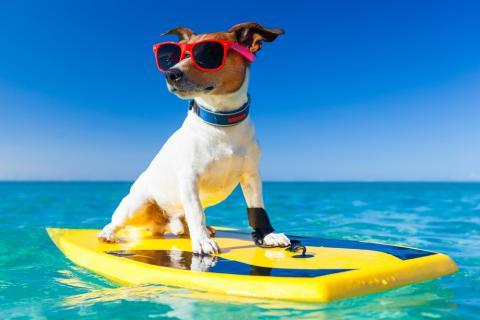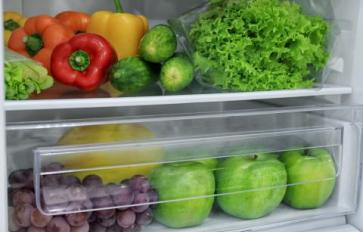
If your four-legged friend seems to be having summertime sadness, don’t ignore it. Like us, our pets too need some specialized care to stay safe in the heat.
Your four-legged best friend is doing a great job keeping you healthy, but are you doing enough to look out for him? While cats seem to handle the heat better by sleeping the sun away, dogs tend to get a tad worn around the edges. But be they dogs or cats or any other four-legged friends of yours, they all need summer care to keep the heat out and the health in. The basics that work for us in the summers work for them too—and it’s all about keeping them away from direct heat and adding a lot of hydration. Here are some tips for you to keep your pet safe and healthy in the summers.
1. Be Water Sure
The same way you need to up your intake of fluids (and especially water) in the summers, so do your pets. Of course, unlike us, pets can’t browse the internet to check how much water they need, so it’s up to us to keep kitty and pooch well hydrated. Cats are notoriously deficient drinkers since the carnivore in them assumes they will get it from their food. Along with keeping accessible water bowls for your pets, give them a mix of dry and wet food. Dry food alone can cause dehydration if pets don't drink enough water so gravy or soup-based meals may work best.
2. Add Coolants To Their Diet
You can’t really expect your carnivorous feline to go for cooling fruits, but you can give her a cool (not cold) bowl of milk to lap up every now and then if she likes her dairy. You can give your cat some cool veggie treats too—think carrots, celery, asparagus, broccoli, green bell peppers, and zucchini. For dogs, you can also add some fruits like watermelon, peaches, strawberries, blueberries and mango. Some pets also dig ice, so as long as your cubes are small, you can give them an icy treat every now and then. Most dogs love a cool yogurt treat too, just don’t sweeten it with anything but fruits. Let your pet decide what he or she wants or doesn’t—do not force it down their throats!
3. No Barbecue Scraps, Please
Summers often means backyard barbecues—and these are a double-edged sword for your pet. Firstly, your pet may try to filch some of that raw meat—and if he does, he may fall prey to disease or at least a stomach upset. Secondly, dogs seem to have a real infinity for charcoal briquettes and may even choke on one. Finally, all those bits and pieces of discarded fat and drippings that your pet ends up eating as scrap can actually cause pancreatic failure in them. So when you are barbecuing, make sure all your guests know the house rules—no feeding the pets. Plus, it’s better you keep your rambunctious pooch or curious kitty in another part of the house to ensure their safety and health. Feed them beforehand so that the flavors don't tantalize them as much.
4. Poor Appetite? Deworming Is A Must
When thirsty, your pedigree pet may end up drinking water from the mangiest puddle around—and that’s common so don’t rile yourself up. Go to the vet and ask him or her to prescribe some safe deworming or anti-parasitic medicines to keep your pet safe in the summer.
5. Frequent Baths Or Wipes Are Cooling
Your pooch can be given weekly or fortnightly baths, depending on his age, health, and breed—it’s best to consult your vet for the correct schedule of baths for your dog. As far as your cat is concerned, felines don’t need to be bathed unless they get dirty or mucky or sticky. But you can wipe down a conducive cat with special cat wipes to mildly dampen the coat and keep them a little cooler and fresher.
6. Keep Coats Long But Not Shaggy
We all love a haircut in the summers because shorter hair means less of a sweaty mess—but the same does not work on pets. The coat you see on your dog or cat also works as a cooling mechanism for them—chop it too short and the summer sun will give them sunburn! You may want to chop it to a more manageable length but that’s it. Remember to groom your dog by brushing the coat twice a week—this helps the pooch in regulating his internal body temperature as well. For cats, well, they happily groom themselves all the time.
7. Pet-Safe SPF May Be Needed
For breeds that have less hair, or who have just had their hair shorn off, you will need to protect all that exposed skin with soft cotton clothing or pet-safe SPF. Since they may have a tendency of licking stuff off their bodies, make sure you get an organic SPF that is safe for animals even when ingested.
8. Cool Their Favorite Spot
Many pets have that one spot they totally think is theirs. For cats, it could even be a very incongruous kitchen sink or armoire top, while for dogs it could be any cool spot in the shade. Make that spot even more comfortable for them by mopping it down before they settle in for a nap. Install a fan at a safe distance or height, and add some shade to create a cool nook for your pooch or kitty to relax the heat away.
9. Keep Them Off Hot Asphalt
While cats get away with this by not needing to be walked, do not take your dog out on a hot day on the asphalt. Their paws are sensitive to temperature and they may actually get injured or burned when the tar heats up—plus they can actually overheat because of this. Train him to go relieve himself in the cooler hours of the day.
10. Make Sure The Garden Is Pet Safe
There are many summer plants not so great for pets; in fact, some are downright toxic. Don’t plant those beautiful but deadly blooms because they can be dangerous for your pet, who may like to spend more time in the garden in the cool summer mornings and evenings.
11. Try Pet-Friendly Bug Repellants
Mosquitos are not just a pain for us, they pester pets too. So look for some organic bug repellants that your pet can lick off with no health problems, or try planting some pest-repellant plants in your yard.
12. Pet Lifejackets Can Save A Life
You may be around a lot of water bodies to beat the heat, and if allowed, so will your pet. Pools, rivers, lakes, or even the beach—and if your little pooch isn’t all that great of a swimmer yet, put a pet life-jacket on him to keep him safe from any swells or unexpected tumbles. Your cat, on the other hand, is safe. There’s nothing that can actually make her enter the water or even be near it so on a water-holiday, leave the kitty at home.
13. Keep Your Home Cool In Peak Sun
When it’s really warm outside, turn on the air conditioning at home to give yourself and your pet a break from the relentless sun. From 12 noon to 4:00 in the evening, your pets should ideally be at home to escape the harshest of the sun’s rays.
14. Keep An Eye Out For Heat Exhaustion
Despite taking precautions, your pet might just fall prey to heat exhaustion. Dogs tend to drool, look a bit out of it, and also be on shaky legs when they get swamped by the heat. In case your pooch is running a temperature that has not crossed 104F, lay him down in a cool spot and cover with a slightly damp towel. Don’t use ice but do give him cool water to lap on. The same works on cats as well, though they may additionally vomit and also be very lethargic. If the temperature of your cat reaches over 103F, take your pet to the vet but if it’s over 105F, run to the vet! For dogs too, 103F and above means a fever but 106F means danger. Always keep a pet first-aid kit at hand as well for any emergencies.
15. Never Lock Your Pet In A Car On A Hot Day
Finally, you may think your chore will just take 10 minutes and it's safer or more convenient to keep your pet in a locked car with the windows up—but you’d be very, very wrong! Dogs and cats cannot regulate their body temperature like we can, and it’s very easy for them to get overheated in a hot car within 5-10 minutes. Any longer and their body temperature spikes up enough to harm internal organs. So please, keep them safe and leave them at home, or take them with you to run that errand.
Do keep yourself and your pets safe in the summer. Having a four-legged friend is the best thing that could have happened to you, so keep your pooch or kitty safe and in the best of health.








